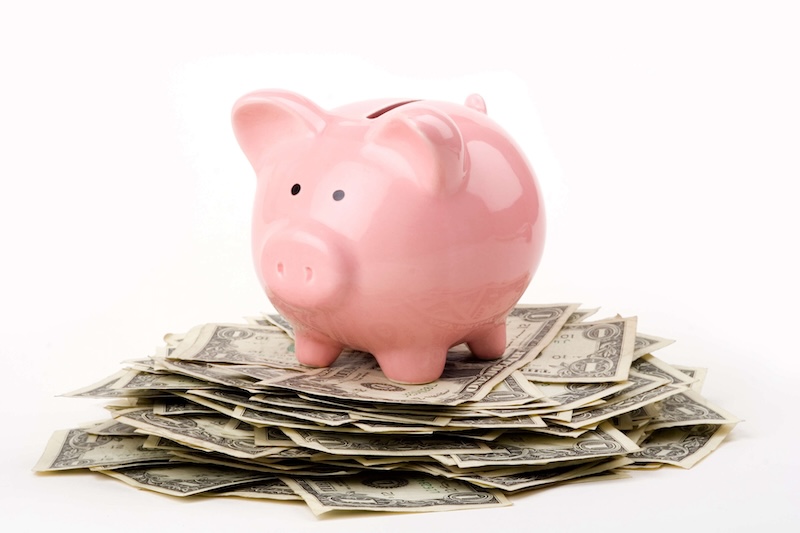What Is a High-Yield Savings Account?
Deciding where to put your savings is an important piece of achieving your financial goals, and understanding your options is a great first step. A high-yield savings account is one option that, under the right circumstances, can be useful when seeking a return on your savings. It's important to know how a high-yield savings account works so you can make an informed decision with your money and understand how best to manage it going forward.

What is a high-yield savings account?
A high-yield savings account is a deposit account that offers higher-than-standard interest rates and usually has some requirements associated with it. When you open a high-yield savings account, the money you deposit earns interest that compounds at set intervals, like daily or monthly. Interest rates vary by account, but some high-yield savings accounts offer an Annual Percentage Yield (APY) of more than 4%.
High-yield savings accounts usually have certain requirements associated with them, and they can vary by the institution. These include carrying a minimum balance above a certain amount, fees if your account drops below the minimum balance, and an initial deposit amount required to earn the APY.
Insured High-Yield Savings Accounts
When shopping around for a high-yield savings account, it’s important to choose one that is insured. High-yield savings accounts can be FDIC-insured or NCUA insured up to $250,000 per person per institution. This means your money is safe if the bank, credit union, or financial institution fails. It is important to note that nonbank and fintech companies themselves are not FDIC-insured; instead, money you deposit at these institutions may qualify for a “pass-through” FDIC-deposit insurance coverage. Make sure to read the disclosures and terms of service carefully to understand if the account may be eligible for FDIC insurance.
High-Yield Savings Account vs. Traditional Savings Account
The current national average interest rate on savings accounts is 0.46% APY, and a traditional savings account will typically earn you close to that. On the other hand, the best high-yield savings accounts can earn you much more in interest than a traditional savings account. For example, a high-yield savings account through Upgrade* can earn you more than 4% in interest1 on the money you deposit into your account—9X more than what you can earn with the average traditional savings account APY.**
Despite this difference in APYs, traditional and high-yield savings accounts typically have one big similarity: variable interest rates. Financial institutions frequently adjust their interest rates based on the Federal Reserve’s rate moves or as they otherwise disclose, which means the interest rates for both traditional and high-yield savings accounts can change at any time.
Is a high-yield savings account right for your money?
Before you open a high-yield savings account, determine if it’s a good fit for your money. Most importantly, you’ll want to consider how soon and how frequently you plan on dipping into the funds. Money you use to pay for monthly expenses, like rent and utility bills, might be better suited in a checking account that earns rewards; money you don’t use as frequently may be better suited for a high-yield savings account where it can accumulate interest. A high-yield savings account is an especially great choice if you’re building an emergency fund or saving for a large purchase, as your balance will accumulate more interest the longer you leave it in the account.
Benefits of High-Yield Savings Accounts
One of the most obvious benefits of high-yield savings accounts is the higher-than-average APY. Other benefits include:
- Digital tools that allow you to access your money: Many high-yield savings accounts offer apps and online platforms that allow you to manage your savings easily through your device.
- Accessibility: Money in a high-yield savings account is typically easily accessible and can be withdrawn if needed (although, sometimes there’s a limit to the number of withdrawals or the amount you can withdraw in a given period, or require advanced notice to withdraw funds). Compared to something like a certificate of deposit (CD) where you cannot withdraw money for a set length of time, the money in a high-yield savings account is much more accessible.
- Higher-than-average APY: Again, you can typically earn much more in interest with a high-yield savings account than you could with a traditional savings account, helping you grow your savings faster.
What to Keep in Mind When Opening a High-Yield Savings Account
Many high-yield savings accounts may seem like the perfect fit for your money, but it’s good to assess each option for some key factors before opening an account.
Initial Deposit
Many high-yield savings accounts require an initial deposit to earn APY, which can vary by account and institution.
Withdrawal Limits
The Federal Reserve Board's Regulation D (Reg. D) used to limit the number of withdrawals from deposit accounts to six per statement cycle, but that limit was removed in April 2020 as a reaction to the financial disruptions caused by the COVID-19 pandemic. Some financial institutions kept their limits in place, and some still limit withdrawals to six per statement cycle. Check with the institution to fully understand their withdrawal restrictions so you aren’t caught by surprise if and when you need to withdraw money from the account.
Minimum Balance
Many high-interest savings accounts require you to keep a minimum balance in your account to earn the APY. If the account has a minimum balance requirement, determine if the amount feels doable for you to deposit upfront before opening an account. For example, Premier Savings through Upgrade* requires a minimum balance of $1,000 to earn its APY.^ On the flip side, the more money you deposit, the more you’ll earn with the account’s APY.
Fees
Some accounts incur monthly maintenance fees and/or fees if your account balance falls below the required minimum. However, others like Premier Savings through Upgrade, have no fees. Consider which fees (if any) you’re comfortable with as you make your decision.
Compounding Frequency
“Compounding” refers to the process of earning interest on your actual savings plus earning interest on all of the accumulated interest from previous periods. Compounding can multiply your savings at an accelerated rate, especially if it’s compounding daily. Check the compounding frequency—yearly, monthly, daily—for each of your top contenders.
Variable Rates
High-yield savings account rates are variable and can fluctuate based on external factors. For example, the interest rates charged by the Federal Reserve can result in changes in the calculation of rates paid on deposit accounts, like high-yield savings accounts. Since high-yield savings account rates are variable, you may want to monitor them and shop around for the best rate frequently. Or, you may be happy opening an account and leaving it as is, even if rates decrease.
Summary
Depending on which financial institution you choose to open an account with, you may be able to do so online. For example, you can open a Premier Savings account through Upgrade online in just a few minutes. Ultimately, you want to choose the account that works best for you, and doing your research can help you make an informed decision that works for your money.
________________________________________________________________________
*Deposits to Premier Savings are eligible for FDIC and/or NCUA deposit insurance up to $1 million or more through Cross River Bank, Member FDIC and Participating Institutions. Learn more about the Custodial Program and Participating Institutions. Cross River Bank may place some or all of the funds held in your savings account(s) into an account at one or more other Participating Institutions. Each Participating Institution is either (1) a FDIC-insured depository institution that only covers the failure of insured banks, or (2) a credit union that is eligible for insurance through the NCUA Share Insurance Fund if the credit union fails. Funds are insured up to $250,000 per ownership category and per institution. Certain conditions must be satisfied for FDIC deposit insurance coverage to apply to any funds held at a FDIC-insured depository institution. Upgrade is not a bank and is not FDIC insured. You are responsible for monitoring where your deposits are held (available in your Upgrade dashboard) to determine the extent of FDIC and/ or NCUA insurance coverage available to you.
**The average national savings account interest rate of .45% is determined by the FDIC as of October 21, 2024 (FDIC National Rates).
1 This Annual Percentage Yield (APY) is effective as of November 12, 2024. The APY for the Premier Savings account is variable and may change at any time.
^There is no minimum balance to open your account, but you will only earn the APY on the days when the closing balance of your account is or exceeds $1,000. On days when the Premier Savings account closing balance drops below $1,000, the APY will be 0%.


